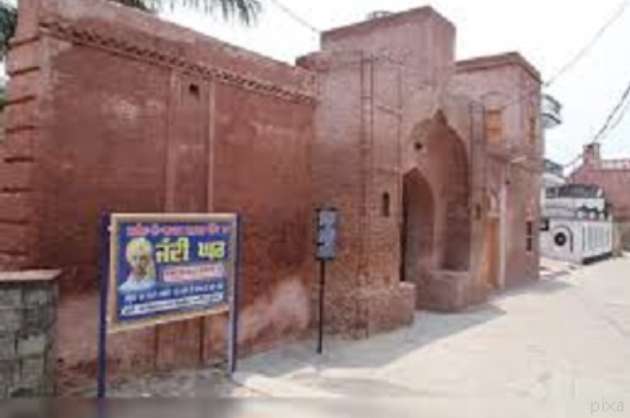Anupama Nair
www.mediaeyenews.com
Khatkar Kalan, a place in the part of Indian Punjab is in the news now a days, for it’s relationship with the legendary Bhagat Singh. The newly elected Punjab Chief Minister Bhagwant Mann, took oath in this village associated with the martyr. So, I thought let me do research on it. I was confused as far as I know, Bhagat Singh was born and died in Lahore, which unfortunately is in Pakistan. However, then I discovered that the Punjab village had a connection with India's freedom struggle, and will always be associated with Bhagat Singh as his ancestral place.
Bhagat Singh was not born here and never lived in the village also. Bhagat Singh was born on September 28, 1907 in Banga village in Lyallpur district in Lahore. He had visited Khatkar Kalan with his grandfather Arjan Singh but never lived there, said the villagers with pride in their voice. Imagine how proud the people of Lyallpur would be! "Arjan Singh used to bring his grandsons Bhagat Singh and Jagat Singh (who died early in 1917 due to a influenza), to Khatkar Kalan and the house every summer. Everyone in my family knew about this," said his Ludhiana-based nephew Jagmohan Singh. "I interviewed people of Bhagat Singh's age in Khatkar Kalan who also verified the same. So yes, this is a confirmed fact that Bhagat Singh did visit the village multiple times", he confirmed.
A famous historian Chaman Lal, who was the author of several books on the legendary Bhagat Singh, stated that the freedom fighter may have visited the village but never lived there. It is well known that Bhagat Singh was only 23 when he was hanged on March 23, 1931 along with Sukhdev Thapar and Shiv Ram Hari Rajguru for the murder of a British police official John Saunders. The case came to be known as the Lahore Conspiracy Case. He studied till Grade 5 in his village school, and then was enrolled at the Dayanand Anglo Vedic (DAV) High School in Lahore. He studied in the National College in Lahore which was founded by the legendary Lala Lajpat Rai, who was considered as his Guru.
Tracing the family's connection with Khatkar Kalan, it was believed that the family migrated from the village to Lyallpur around the early 1900s after the British allotted land to families in the two newly created districts called Montgomery and Lyallpur.
Many decades later, during the Partition in 1947, the family returned to their Khatkar Kalan house. Bhagat Singh's father Kishan Singh died in 1951, while his mother Vidyavati, who lived in the ancestral home till her death in 1975. The house in Khatkar Kalan stands as a protected monument, was built by Bhagat Singh's great-grandfather Sardar Fateh Singh in 1858. It was later declared a monument under the 'Punjab Ancient and Historical Monuments and Archaeological Sites and Remains Act' (1964) in 1982.
The family shifted to Lyallpur after they were allotted land, explained Lal, who is also a, honorary adviser to the Bhagat Singh Archive and Resource Centre in New Delhi. "The Britishers dug canals and the land of these two districts — Lyallpur and Montgomery were very fertile. Bhagat Singh's family like many families in the whole of Punjab shifted after they were allotted the land. They got the land at 'Chak No 105' in Lyallpur".
There, is also a story behind how Khatkar Khalan got its name many centuries ago.
The beginning of the story was when an ancestor of Bhagat Singh, who traveled from his home in Narli, Amritsar, to Haridwar to immerse the ashes of a member of his family.
The incident occurred even before Sikhism was founded by Guru Nanak in the 15th century. We do not know his name, was crossing 'Garh Kalan' (fort village) and spent a night at the house of a local feudal lord. Impressed with the boy, the feudal lord arranged the marriage of his only daughter with him and gave the village as a dowry. When the marriage was arranged, there was only one condition, the boy had to stay with them and he agreed. So, Garh Kalan, came to be called Khat Kalan. Later, the people started calling the village 'Khatkar Kalan. The story was mentioned in Bhagat Singh's uncle Ajit Singh’s autobiography called ‘Buried Alive’.
Many centuries later, Bhagat Singh's great grandfather Fateh Singh, who dared to defy the British East India Company. In the 1840s, he had fought the British under the great Maharaja Ranjit Singh's army in the Anglo-Sikh war. Unfortunately, much of their land and property was seized by the British East India Company. However, during the First War of Independence in 1857, the then Governor of Punjab John Lawrence called upon Fateh Singh for help against the rebels in return of confiscated property and other rewards, but he refused. Fateh Singh believed it was the test of his life and he believed in the teachings of Guru Gobind Singh who said “wherever people fight for their rights, it is your duty to stand with them. So, he chose his principle, and not property," said Jagmohan Singh, who retired as head of the computer science department in Punjab Agricultural University (PAU).
It sure is an interesting story and I was impressed by the bravery of Bhagat Singh’s ancestors. No wonder Bhagat Singh became who he was.

































